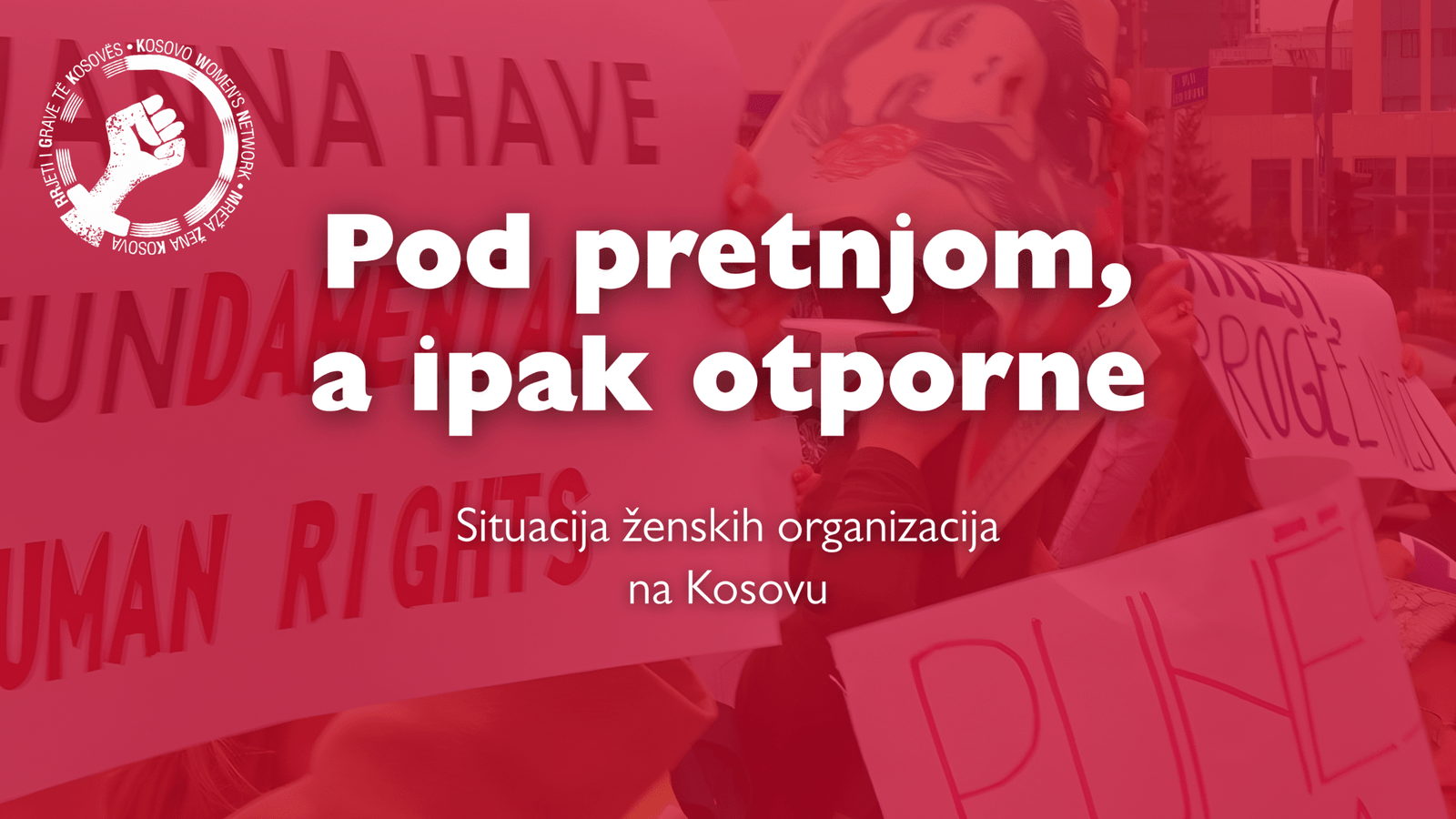Among the challenges they constantly face in their efforts to support women, Non-Governmental Organizations need to be legally compliant, possess appropriate documentation, and demonstrate their commitment. Adherence to the law and possession of such documents facilitate NGOs in applying for and winning grants and various projects. Organizations dedicated to advancing gender equality in Kosovo must register with the relevant authorities to ensure compliance with the current legislation, making their work more efficient.
NGOs often find themselves in situations where they must provide data that attests to the credibility of their organization when applying for projects with various institutions. This may include documents such as the organization’s establishment act, the NGO’s statute, financial management regulations, and more. Those advocating for women’s rights consider it essential for each organization to have its own internal regulations.
Dhurata Prokshi, with experience in writing and coordinating NGO projects, concurs that organizations’ internal regulations enhance their perceived credibility. She notes that the search for the aforementioned data has also become a criterion for organization donors. „Organizations and donor agencies don’t always demand a standalone internal regulations document, but they evaluate the seriousness of an organization’s activities, and its profile, by requesting these documents,“ she explains.
The Perspective of the Kosovo Women’s Network on NGO Management
There are over 12,000 active NGO’s in Kosovo Out of this total, 141 organizations are members of the Kosovo Women’s Network (KWN), operating across the entire country.
In accordance with the Regulation and Code of Conduct for KWN Membership, every NGO seeking to join the network must accept the KWN Statute and Mission, pledge to support KWN’s objectives, complete and submit the KWN membership application, and commit to adhering to the Regulations and Code of Conduct for Membership.
Over the past year, the KWN has released a report evaluating its members. This assessment encompasses the aspect of whether NGOs possess internal documents and regulations. In a separate statistical analysis, KWN also addressed work regulations. According to KWN, out of 141 organizations, 58 members, or 48 percent, have established written regulations for work and behavioral standards that govern their operations.
While Prokshi, who in her career also worked as a project coordinator, said that possessing regulations is, in any case, an indicator of the organization’s seriousness. It can help the organization stand out in the competition compared to others. However, she adds that if such a document was not requested in the call, it may not carry decisive weight.
“Although I have not conducted research in this direction, from what I have come across, I have noticed that large organizations with a wide geographic scope, especially those engaged in policy design, implementation, and monitoring supported by large donors, tend to develop such regulations, but not all,” she said.
Medium and small organizations do not appear to adopt this practice.
According to the Department of NGOs in the Ministry of Internal Affairs, there are a total of 12,433 active organizations in their database. This number includes three possible categories of organizations as NGOs, which are associations, foundations, and institutes.
KWN, with a mission to support, protect, and promote the rights and interests of women and girls throughout Kosovo, maintains ongoing collaborations with NGOs across the region. This network demonstrates that its members represent diverse ethnic groups, various age groups, different abilities, and come from various geographic areas. They collectively address important issues affecting the people, particularly women and girls, within their respective communities.
To further support NGOs, KWN has established the Kosovo Women’s Fund. This fund offers small grants to women’s organizations that lack access to alternative sources of funding and are dedicated to advancing women’s rights, particularly among groups in rural areas and marginalized communities.
According to publicly available data, since the establishment of the Kosovo Women’s Fund, the Network has awarded a total of 289 grants, for 153 organizations. The total value of of these grants so far is 1,771,249.96 Euro.
While the organizations also have support from the Ministry of Justice, NGOs continuously complain that this institutional support is insufficient for their activities.
Afërdita Zeneli, from the NGO „Dita“ operating in Pristina, informed KALLXO.com that they haven’t received any support from either the central or local government throughout this year. She mentioned that they have internal regulations and possess the necessary documents typically required, which have been beneficial in many cases. However, this year, the primary challenge they face is financial constraints.
„We have the documents, but there are still many financial challenges. We don’t receive support from the government,“ she stated.
The Ministry of Justice, in its structure, includes the Department for Social Services Policy, which operated under the Ministry of Finance until December 2022.
In early 2023, the Ministry of Justice, in alignment with its responsibilities, initiated a call for subsidizing NGOs that offer social and family services to citizens in need of social support.
In 2023, as per the Ministry of Justice, the Government of Kosovo has provided support to legal entities, specifically NGOs, amounting to 500 thousand euros for the period of January to April 2023.
The Ministry of Justice has announced that they are currently in the process of allocating financial support totaling 1 million and 500 thousand euros for the period from May to December 2023, extending to February 2024.
The Ministry of Justice’s responses indicated that in 2022, the Ministry of Finance provided financial support to organizations, totaling 1 million euros. Out of this amount, 400,000 euros were designated for shelters, while 600,000 euros were allocated to other NGOs offering social and family services. In 2022, this financial support benefited a total of 44 legal entities, including 10 shelters and 34 other NGOs operating across the country.
Applying for Projects: Supporting Documents that help NGOs
The Kosovo Foundation for Civil Society (KCSF) is an independent, non-profit organization dedicated to fostering the development of civil society and initiatives that promote a democratic culture while addressing the socio-economic needs of Kosovo. The organization places special emphasis on contributing to the process of Kosovo’s integration into the European Union, recognizing that compliance with human rights and gender equality is a fundamental requirement for EU membership. KCSF consistently provides various grants and support to NGOs in their endeavors. On their official website, they offer a detailed list of required documents for NGOs, underscoring the significance of each document.
You can find this list by clicking HERE.
Even Dhurata Prokshi, drawing from her experience, has compiled a list of documents that organizations commonly utilize to „impress donors“ and demonstrate the commitment and seriousness of the applying NGO’s work.
“Auditor’s annual report, narrative work report, certificate from the Tax Administration of Kosovo, certification from the Commercial Court, CVs of the staff responsible for executing the proposed project, and a portfolio of projects, with a particular focus on those closely related to the grant application in question,“ are among the documents she includes in her list.
She emphasizes that these documents serve as indicators of an organization’s development, stability, and commitment in adhering to the laws relevant to its field of operation. Furthermore, she points out that these data have become criteria used by donor organizations for the technical evaluation of applicants, often taking precedence over the evaluation of the content of project proposals.
Prokshi suggests that non-governmental organizations should view the formulation of internal regulations as an essential mechanism for assessing and monitoring the organization’s progress in alignment with its vision and objectives. Additionally, she proposes that the initiative to establish such regulations within NGOs should be driven by the community of institutional donors to better align with international donor requirements.
„One more aspect that needs clarification is that merely having regulations in place as a declaration does not guarantee their implementation within the organization. Therefore, these regulations should be incorporated into contracts to fortify the commitment and the quality of the employee-employer relationship, ultimately advancing the organization’s vision, work integrity, and other essential aspects,“ she stated.
In her view, for such a document to carry significant weight, it should be developed following a standard applicable to a group of organizations, such as the NGO consortiums for children’s rights, environmental causes, or security, and it should be included as a distinct section in reporting. Moreover, legislative requirements mandate the formulation of internal regulations. The law governing freedom of association in non-governmental organizations also stipulates that NGOs must have internal documentation in place.
This law grants NGOs the right to solicit, accept, and utilize financial, material, and human resources, whether they are local, foreign, or international, to achieve their objectives and conduct their activities.
However, the law also outlines the necessary documents for NGOs, beginning with the founding act. This act should contain the organization’s full name and abbreviation, its organizational form (e.g., association, foundation, institute), address, purpose, field of activity, and other pertinent details. Each founder must sign the founding act, while for legal entities, the authorized representative of the legal entity signs it.
Additionally, NGOs are required to have their own statute, which serves as a detailed framework governing the organization’s structure, operations, and activities. You can access the complete law and additional information HERE.
This publication was made possible with the financial support of the European Union Office in Kosovo through the initiative of the Kosovo Women’s Network, “Enhancing the Capacities and Resilience of CSO’s: Furthering Gender Equality Amid the COVID-19 Pandemic.” Its content is the responsibility of Internews Kosova and does not necessarily reflect the views of the European Union Office in Kosovo.







